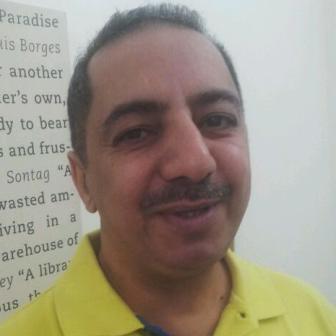Poem
Mohamed Al-Harthy
AFTER WE’RE GONE, THEY KNOW
This is part of your poem ‘The Fishermen’,which I read in a café
near the fish market in Seeb,
waiting for the boats to return
so I could buy one of the fish
that a fisherman had just brought ashore—
a fisherman wearing a striped headwrap
and a short dishdasha,
and whose name I did now know
(just like in your poem).
He was barefoot, and did not have
those long black rubber boots
(and he surely hadn’t read your poem, Merwin),
but he was friendly as we negotiated a price
that was good for him
and good for me,
so I read him the end of your poem while we bargained:
“They carry the ends of our hungers out to drop them
To wait swaying in a dark place we could never have chosen.
By motions we have never learned they feed us.
We lay wreaths on the sea when it has drowned them.”
He liked the end, for he gave an impromptu reply:
“When we drown in the Gulf, the living
don’t lay wreaths in the sea:
after we’re gone, they know
those wreaths would wait for us forever
in the expanses of eternity.
We’ve sealed the deal for the fish,
and this friend of mine
is selling spices and peppers
and coconuts just in from Kerala,
so follow him to his store:
maybe you’ll throw a feast
for your friend the poet, and maybe
he’ll write another poem
about our short dishdashas
and our bare feet.”
(Seeb, Winter 2012)
© Translation: 2014, Kareem James Abu-Zeid
NA ONZE DOOD WETEN ZE
Dit is uit jouw gedicht ‘De Vissers’dat ik las in een koffiehuis vlak bij de vismarkt
van al-Sîb, terwijl ik op de terugkeer van de boten wachtte om vis te kopen
kwam opeens een visser in zijn gestreepte lendendoek
en dishdāsha met vis. Een visser die ik niet kende
(net zoals in jouw gedicht)
Hij was blootvoets en droeg geen lange rubberlaarzen
(en hij had zeker jouw gedicht niet gelezen, Merwin)
terwijl hij aardig was toen we het eens werden over de prijs
die goed voor mij en voor hem was
daarom las ik het slot van je gedicht voor hem bij het onderhandelen:
“Ze nemen de einden van ons hongergevoel mee om er vanaf te zijn,
om zwaaiend te wachten op een donkere plaats die we nooit zouden kiezen.
Met bewegingen die we nooit leerden, voeden ze ons.
We leggen kransen in zee als ze op zee zijn verdronken.”
Het slot beviel hem en spontaan zei hij:
Als wij in de Golf verdrinken, gooien ze
geen kransen in zee
want de levenden weten dat na de dood
die kransen ons wachten
in de eindeloze eeuwigheid
We hadden de koop gesloten
en mijn vriend, de handelaar in kruiden, peper, griesmeel
en kokos die hij gisteravond uit Kerala had gekregen…
ging met hem naar zijn winkel. Als je aan een luxe maal voor je vriend de dichter denkt
misschien schrijft hij nog een gedicht
over onze dishdāsha’s en blote voeten.
(al-Sib, winter 2012)
© Vertaling: 2014, Kees Nijland & Assad Jaber
al-Sîb: Stad aan de kust van Oman dishdāsha: loshangende mantel, traditionele kledij in de Golfstaten
بعد رحيلنا يعرفون
هذا بعضٌ مما جاءَ في قصيدتكَ الصَّيادونقصيدتك التي قرأتها في مقهى قريب من سُوق السَّمك
في "السِّيب" مُنتظرًا عودة القوارب لشراءِ سمكةٍ
هبط بها توًّا صيَّادٌ بإزارهِ المُخطَّط
ودشداشتهِ القصيرة، صيَّادٌ لم أعرف اسمه
(تمامًا، كما جاءَ في قصيدتكَ)
فقد كان حافيًا، ولم يكُنْ يلبسُ الحذاءَ المطَّاطَ الطويل
(وبالتَّأكيد لم يقرأ قصيدتك يا ميروين)
بيد أنَّهُ كان دمِثًا حين اتفقنا على سِعرٍ
ناسبني وناسَبه
لذلك قرأتُ عليهِ -خلال المُساومة- مُختتم قصيدتِك:
"إنهم يحملون نهايات جوعنا ليلقوا بها
كي تنتظر، مُتأرجحةً، في مكان مُظلم لما كُنَّا، نحنُ، اخترناه.
بحركاتٍ لم نتعلَّمها أبدًا، يُؤمِّنون لنا القُوت.
وعندما يُغرقُهم، نُلقي بالأكاليلِ إلى البَحر".
أعجبَهُ المُختتم ، فعلَّقَ بعفويَّة:
حين نغرقُ في الخليج لا يُلقون بالأكاليل إلى البحر
لأنَّ الأحياء بعد رحيلنا يعرفون أنها ستكون دائمًا
في انتظارِنا، تلك الأكاليلُ في مُنفسَحِ
الأبديَّة.
ها قد أنهينا صفقة السَّمكة
وصديقي هذا بيَّاعُ توابل وبهارات وفلفل وجَريش
جوز هند وصَلتهُ أمس من كيرَلّا...
رافقهُ لدُكَّانه؛ إنْ فكَّرتَ بوليمَةٍ باذخة لصديقِكَ الشَّاعِر
عَلَّهُ يكتُب قصيدةً أخرى
عن دشاديشنا القصيرة وأقدامِنا الحافيَة.
(السِّيب، شتاء 2012)
© 2013, Mohamed Al-Harthy
From: عودة للكتابة بقلم رصاص (Back to Writing with a Pencil)
Publisher: Dar al-Inteishar al-Arabi, Beirut
From: عودة للكتابة بقلم رصاص (Back to Writing with a Pencil)
Publisher: Dar al-Inteishar al-Arabi, Beirut
Poems
Poems of Mohamed Al-Harthy
Close
AFTER WE’RE GONE, THEY KNOW
This is part of your poem ‘The Fishermen’,which I read in a café
near the fish market in Seeb,
waiting for the boats to return
so I could buy one of the fish
that a fisherman had just brought ashore—
a fisherman wearing a striped headwrap
and a short dishdasha,
and whose name I did now know
(just like in your poem).
He was barefoot, and did not have
those long black rubber boots
(and he surely hadn’t read your poem, Merwin),
but he was friendly as we negotiated a price
that was good for him
and good for me,
so I read him the end of your poem while we bargained:
“They carry the ends of our hungers out to drop them
To wait swaying in a dark place we could never have chosen.
By motions we have never learned they feed us.
We lay wreaths on the sea when it has drowned them.”
He liked the end, for he gave an impromptu reply:
“When we drown in the Gulf, the living
don’t lay wreaths in the sea:
after we’re gone, they know
those wreaths would wait for us forever
in the expanses of eternity.
We’ve sealed the deal for the fish,
and this friend of mine
is selling spices and peppers
and coconuts just in from Kerala,
so follow him to his store:
maybe you’ll throw a feast
for your friend the poet, and maybe
he’ll write another poem
about our short dishdashas
and our bare feet.”
(Seeb, Winter 2012)
© 2014, Kareem James Abu-Zeid
From: عودة للكتابة بقلم رصاص (Back to Writing with a Pencil)
From: عودة للكتابة بقلم رصاص (Back to Writing with a Pencil)
AFTER WE’RE GONE, THEY KNOW
This is part of your poem ‘The Fishermen’,which I read in a café
near the fish market in Seeb,
waiting for the boats to return
so I could buy one of the fish
that a fisherman had just brought ashore—
a fisherman wearing a striped headwrap
and a short dishdasha,
and whose name I did now know
(just like in your poem).
He was barefoot, and did not have
those long black rubber boots
(and he surely hadn’t read your poem, Merwin),
but he was friendly as we negotiated a price
that was good for him
and good for me,
so I read him the end of your poem while we bargained:
“They carry the ends of our hungers out to drop them
To wait swaying in a dark place we could never have chosen.
By motions we have never learned they feed us.
We lay wreaths on the sea when it has drowned them.”
He liked the end, for he gave an impromptu reply:
“When we drown in the Gulf, the living
don’t lay wreaths in the sea:
after we’re gone, they know
those wreaths would wait for us forever
in the expanses of eternity.
We’ve sealed the deal for the fish,
and this friend of mine
is selling spices and peppers
and coconuts just in from Kerala,
so follow him to his store:
maybe you’ll throw a feast
for your friend the poet, and maybe
he’ll write another poem
about our short dishdashas
and our bare feet.”
(Seeb, Winter 2012)
© 2014, Kareem James Abu-Zeid
Sponsors





Partners
LantarenVenster – Verhalenhuis Belvédère


